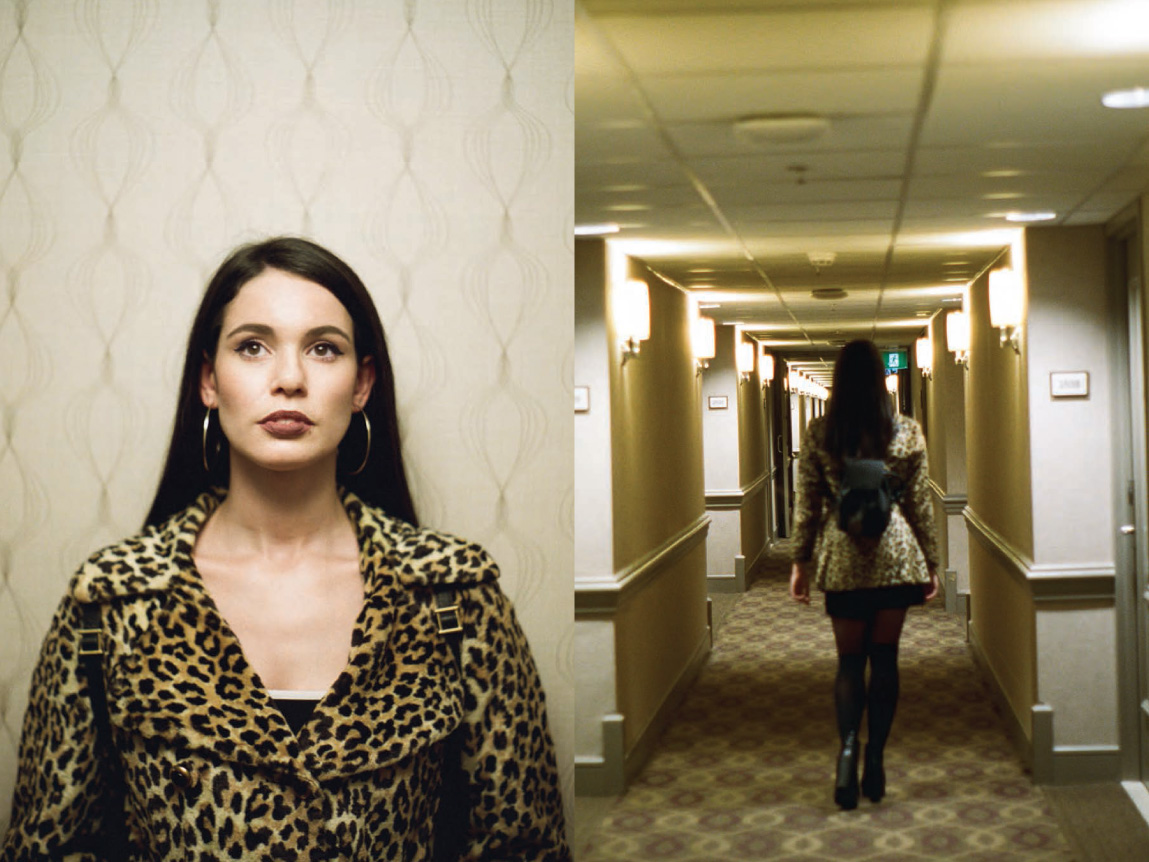The Untitled Magazine caught up with Andrea Werhun, the author of a daring new book, “Modern Whore,” which chronicles her years as a sex worker. The provocative collection of true stories is accompanied by photographs of the former escort by Nicole Bazuin.
Sex worker rights have gained momentum over the years, and with the recent bills FOSTA/SESTA (FOSTA “Allow States and Victims to Fight Online Sex Trafficking Act” and SESTA: “Stop Enabling Sex Traffickers Act”) passing the House and Senate there has been much talk about how the new laws, which came into effect on April 11, 2018 in the US, will impact the industry. While some countries such as New Zealand and Germany have legalized or decriminalized sex work over the past few decades, the US seems to be tightening the reins. Werhun, a writer for Playboy, is unabashed about her former career as a prostitute, and her new book sheds light on her personal experiences which she shares in order to confront the negative stereotypes placed on sex workers and women who overtly express their sexuality. Werhun advocates for sex work decriminalization and the reduction of stigma related to the work. She considers sex work to be “an empowering, flexible and well-paying job” and rejects the idea that it is universally victimizing. Read on for our exclusive interview with Andrea, who not only addresses these topics, but shares insight into the world’s oldest profession.
Indira Cesarine: Sex work is a very explosive topic. There are a lot of things going on, especially in the United States, that are putting sex work on the forefront. I know you’re Canadian – how does Canada differ from the United States in terms of the legalities of sex work?
Andrea Werhun: In Canada, prostitution itself is not illegal but everything surrounding prostitution is. So communication [regarding prostitution] is illegal and living and working in an indoor space with other sex workers is illegal. [it’s illegal for] anyone to profit [from sex work]. I don’t know exactly what the American laws are. I know that in light of SESTA, things have just gotten a lot more dangerous.
And just like in the United States, pornography and exotic dancing is legal. So entertainment when it comes to sex isn’t a problem, but actual sex work and profiting from sex work is? I understand in 2014 they passed new laws which make it illegal to purchase sexual services but legal to sell them?
Yes.
You mentioned SESTA. What’s your opinion on that? Will it affect Canadians?
It will affect sex workers who want to go to the U.S. That’s how I see it affecting me as a Canadian. It’s currently illegal for a sex worker to enter the U.S. having done sex work within the last ten years. It’s going to be difficult for sex workers to get over the border.
What about the parts of SESTA that won’t necessarily affect crossing the border, but are more about online content promoting sex work?
What SESTA does is criminalize an online paper trail of having performed sex work. So any Twitter activity, any online advertisements that can be traced back to a [sex worker] via email, is now illegal.
It would have to be for illegal sex work though, not if you promoted yourself as an erotic dancer or actress. And escorting, for example, is technically legal.
The problem is that it’s very unclear right now how SESTA/FOSTA is going to come down on people. Publications and community spaces where sex workers advertise to potential clients or speak to each other have already been shut down. Google has reacted by deleting people’s personal drives of pornographic content that they’ve made themselves and perhaps have been looking to profit on, which is legal—it’s totally legal to sell your pornography. That’s where the lines get blurred.
Will Tinder and all those dating apps be affected?
That’s in question. A lot of people have raised the alarm on whether dating apps have fallen into the purview of this law. It’s very possible that they might actually shut down. Sex workers have brought up Tinder as a possible outlet that could be affected.
Tinder as an app has a reputation for being more sexually provocative. It wouldn’t surprise me if it were used to solicit clients.
For sure. As an example of how unsure everyone is, Microsoft recently changed their terms of service in reaction to the law and said that they will be monitoring all Skype calls to scan for nudity or profanity. A lot of sex workers make their money on Skype shows.
Wow. Aren’t sex calls legal?
They should be. But this is the grey area of this law, because it’s so overarching. We don’t know exactly how far it will reach. It’s the nudity on Skype that’s against their community guidelines now.
I’m curious to see if iPhones and Facetime will be affected. All the issues this law is raising are very interesting.
Sex workers are just the canaries in the coalmine being directly affected by this law that, first and foremost, will make their lives unsafe and more prone to violence. But this also affects everybody else. It’s first and foremost a censorship law—a law against sexual communication online, which a lot of us do casually, and not for money. That’s all at risk of being criminalized.
I understand that your book, “Modern Whore: A Memoir,” launched on International Sex Workers Rights Day. Can you tell me a bit about the launch and the response?
It was fantastic. The launch in New York went really well. We filled the room at the Jefferson Market Library to capacity; it was filled with people who were curious about the book but most importantly, sex workers. It was really refreshing for me—I’ve done a lot of readings and [this time] there was a very different vibe to the room, I think because it was International Sex Workers Rights Day and a lot of New York sex workers came out to support the project. I would talk about certain things, like escort review board culture, and I could hear a collective groan in the room. There was something in my heart that fluttered because I knew I was in a room filled with people who actually understood what it’s like to be a sex worker. It couldn’t have gone any better. The reaction post-New York launch has been very positive. We’ve gotten a little more press, and we have some things in development that we’re planning on announcing soon.
I know your book is very autobiographical with a lot of accounts of your own experiences as a sex worker. You mention that you haven’t been an active sex worker for five years. How long were you doing it prior to that?
Only two years.
Is there a reason you decided to discontinue sex work?
I originally quit escorting because I signed a contract with my mom that had an exact date on which I would quit the industry. I told her [about my job] six months into my escort career, and it was quite traumatizing for her. Eventually, she came around and a year into escorting, I graduated university. When we were all together with my dad, brother and boyfriend getting a celebratory lunch, the fist thing she asked was, “so, when are you going to quit that job of yours?” So I said by my next birthday, which was a year from then, and she said “great, I’ll get that in writing.” So I wrote a contract with my mom and I stuck to it.
Is there any other reason you felt you should quit? You mention in your book that sex work is an empowering, well-paying job…
It depends on where you’re at in life, and what you want out of life. While sex work can be quite empowering as a job, especially because of the financial power that one can have access to, the other side of being a sex worker is that there’s so much stigma against the job. You can’t tell anyone what you’re doing—you basically have to live in hiding. That can be an incredibly disempowering position to be in, to have to lie to every single person around you about what you do and how you make your money. I found that I was experiencing anxiety and other mental health issues as a result of my continuous hiding and lying.
Were you worried other people would find out?
Yeah, I was afraid of being blackmailed, people outing me and judging me. I was starting to develop this feeling that people already knew, that people were talking behind my back. It was time for me to quit. And then I had this opportunity to live and work on a farm two hours away from the city so I thought, I have nothing to lose; I’m going to go do this. So that’s why I quit the sex industry. It’s not empowering for everyone. It is not uniformly empowering. There are many factors that contribute to sex work being an incredibly disempowering job, especially if you don’t have a ton of privilege—if you are a person of color, or if you don’t have a high level of education. I’m a privileged person. I have a university background; I’m a white girl who has beauty privilege; I can come out and talk about these issues and be okay, but not everybody can. I will always have other options. Even if I feel hopeless, my privilege grants me other options automatically.
Have you ever experienced violence on the job?
I was raped twice on the job. For perspective, I’ve had sex with over 500 clients. Out of 500 I only had two negative experiences, which is pretty damn good statistically.
Do you think if sex work were legal, there would be less rape?
If it were decriminalized and sex workers could speak openly about their job, there would be a lot less impetus for predators to rape people who they know can’t say anything.
Can you explain to our readers the difference between the concept of sex work being decriminalized and legalized? How would you define the difference?
The difference between legalization and decriminalization is really a difference in the way we look at sex work. Legalization, or the regulation model, sees sex work as a necessary evil in society, something we’re never going to get rid of that we may as well regulate. That means instituting new laws to facilitate sex work. Say, in Amsterdam, they have the Red Light District—that’s an example of the legalization model, where it’s only legal to perform sex work within the confines of that district. If you perform sex work outside of the Red Light District, you are breaking the law and are a criminal. The decriminalized model sees sex work as work, or a legitimate form of labor. That would take away the laws that currently criminalize [sex work], and have sex work be governed by existing labor laws. So all [crimes] that can happen—especially in a criminalized profession such as sex work like rape, murder and assault—would remain illegal. Sex workers could do their work without being afraid of getting arrested if they try to report a rape and they’re not sure if they’re the ones who will be punished and not the perpetrator of the crime.
Reporting rape is complicated even for non-sex workers. It’s an unfortunate issue across the board. I’m sure you’re versed with the laws in Germany, how sex workers are taxed and are fined to work in brothels. Are you familiar with how legalization has worked in other countries?
I don’t have encyclopedic knowledge, but I do know that the Nordic model in Sweden, which has been popularized and instituted in France, Ireland and also Canada, is a model that supposedly protects the prostitute and punishes the John. [It holds] that all prostitutes have been forced into the sex trade and are victims of Johns who are perpetrating violence against them. The idea that you save the whore and punish the client is purported to be a feminist model.
What are your thoughts on that? It seems you don’t think highly of this model.
I don’t. It continues to force women into further, darker reaches to get clients. If Johns are the ones facing criminalization, they’re not going to answer an ad online or pick someone up off the street. They’re going to go to pretty dark reaches to find people, and that gives sex workers no opportunity to screen clients. That’s the reason why communication laws are so dangerous to sex workers—if sex workers can’t screen a client before she sees him, she has no idea if he’s a murderer. Making it more difficult for Johns to communicate with sex workers does not make it safer; it’s actually been proven to make sex work more violent. However, the opposite situation is happening right now in New Zealand, which is the only country in the world that has decriminalized prostitution. I believe it’s been decriminalized since 2010. I’m not sure what year exactly, but it’s been a while. They have found a drastic drop in violence against sex workers. You have more sex workers approaching law enforcement to report crimes perpetrated against them. [Sex work] is now governed by labor laws, and there was a very seminal case in which a woman who worked at a brothel, as a sex worker, was being sexually harassed by her boss in the workplace. She brought charges of sexual harassment in the workplace against him, and she won. What that says to society, or at least New Zealand, is that sex work is work, and that it doesn’t matter what job you have—you are not entitled to abuse by your boss. No one has to endure sexual assault or abuse or harassment in the workplace. So many [sex workers] see that as the most empowering model.
I believe prostitution is legal in Germany as well.
Well, it’s decriminalized in New Zealand and legalized in Germany. It’s a big difference.
It’s legal in the sense that you can go to employment agencies in Germany and get a job as a sex worker. There’s still a stigma attached to it, but it’s not a criminal activity.
It’s only criminal if you go outside the bounds of where it’s legal to do it. That’s the problem with legalization. It’s certainly an improvement over the current model that exists in Canada and the U.S., which just fully criminalizes sex work, but it also stigmatizes sex work as a necessary evil. Like, we wish it didn’t exist but it does exist and we’re never getting rid of it, so let’s just put all [sex workers] into an area and they can pay taxes. But it doesn’t respect sex work as a job.
In an ideal world, where would you like to see things go? You obviously believe in decriminalization, but do you think there should be any regulations that go along with that? Do you see people being able to major in sex work in college, or get a certificate in sex work like you would a certificate in massage therapy? That’s something we need to ask ourselves: if sex work is decriminalized, where does it go next? Fast-forward 50 years, where do you think sex work should be in society?
50 years is a long time from now. I’m not even sure the world will exist in 50 years! But if it does, it would be really awesome if sex workers could be appreciated, not only for what they do professionally, but also for the other qualities that make them good at their job. I think what a lot of sex workers have in common is a hustle: an entrepreneurial spirit, a desire to live and work independently. Sex work continues to be criminalized in a world where it doesn’t make sense for pleasure to be criminalized. I hope that in 50 years, people look back and say, “Wow, we were so confused about sex.” I hope the power that a lot of sex workers feel in their jobs is celebrated. [For some], there are very practical reasons to [repress] sexually open, independent, entrepreneurial, successful, intelligent women. I hope we live in a world where these qualities in women are fostered and celebrated, where sex workers can openly be leaders of their communities. I want government institutions to be able to interact with sex workers without being afraid or being disgusted and thinking that there must be something wrong with them for having chosen the industry. I really hope we can see a world where sex work can be put on a resume—one where, if a sex worker wants to leave the industry, she can find another job and transfer her skills to another position and be taken seriously.
The idea of being able to put sex work on your resume is, in itself, a big statement.
It’s something I personally grapple with. I deal with this on a regular basis, whether or not I go back to sex work. Sex work opens its arms to everybody. You don’t need a resume to become a sex worker; there are no barriers to employers. The clientele is there. It’s a sellers’ market. You can always make money with sex work.
When you put it in perspective, you’re a young, beautiful girl still in her 20s. Say a woman educates herself or gets a degree in law. As she gets older, her ability to earn an income increases. But often with sex work, as a women gets older, the ability to earn an income decreases. What do you do when you’re in your 50s and get fewer clients and can’t pay your rent anymore? I’m curious as to what New Zealand does with sex workers regarding ageism and handling senior sex workers. If it’s decriminalized and there’s no stigma attached to being a prostitute or a Madame, as you get older, would you have to start working in other aspects of sex work? As women age, I would think that they have less of a demand with clients.
Absolutely. It’s not a forever job for the vast majority of people. But for people like me, who need a part-time job to survive while they focus on their dream—which for me, is writing and performing—sex work is ideal. And I hear what you’re saying about my young, beautiful, in my 20s privilege, which is very true, but [sex work] is not necessarily something that everyone can excel at and profit off of. Certainly your selling potential diminishes as you get older, but it’s still a pretty open opportunity industry where you can find ways to make money, even as you get older. Even if you’re not a pretty girl, there are lots of ways to profit from the industry. I’m not endorsing it as something everyone should do, but poverty is one hell of a motivation for a lot of sex workers. The desire to not be broke motivates most of them—and it’s pretty good in that regard. Of course, it comes with a lot of pitfalls such as not being able to tell people what you do, or call the cops when something bad happens.
I hope that your book raises more discussion of all these issues. From a feminist perspective, there’s mixed response regarding prostitution and pornography. It’s great that you’re shedding light on all these issues with your book. Are you planning on any other book tours or events?
We’re hoping to go to Los Angeles next. We just got the book at a store there, at Stories on Sunset.
Interview by Indira Cesarine for The Untitled Magazine
All images courtesy Andrea Werhun and Nicole Bazuin.











